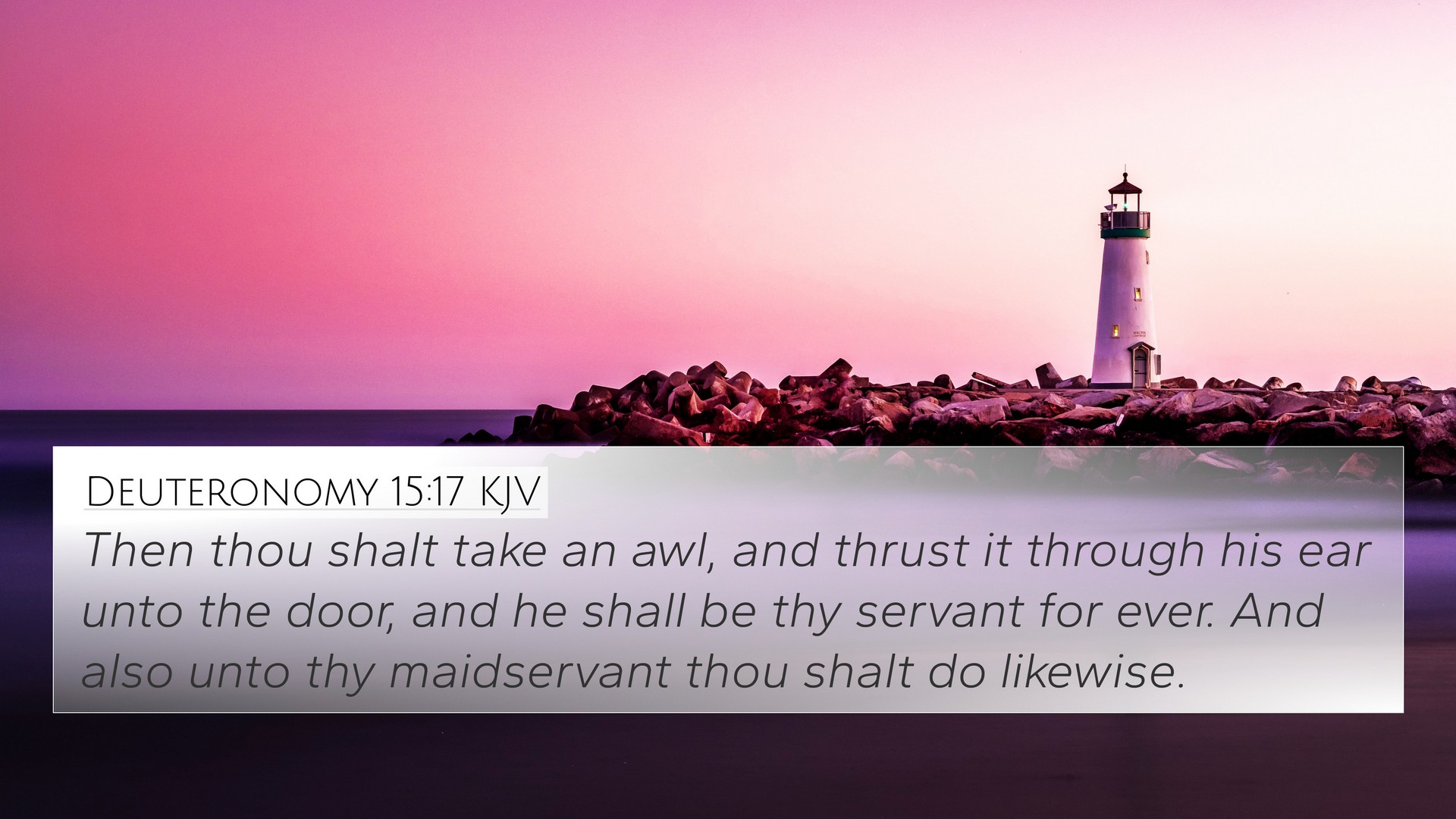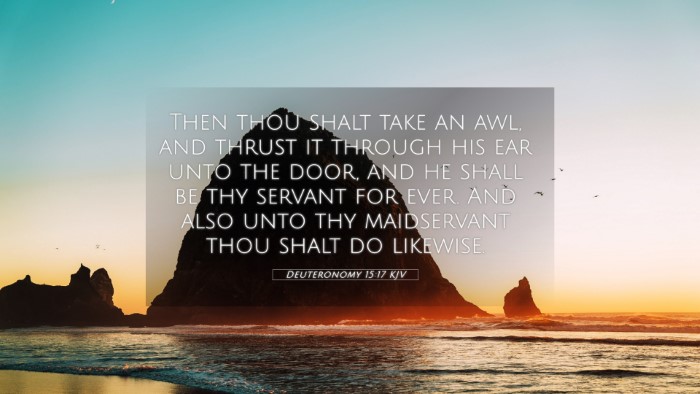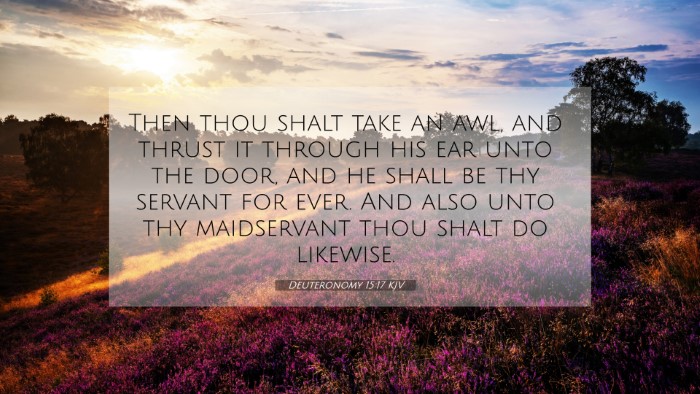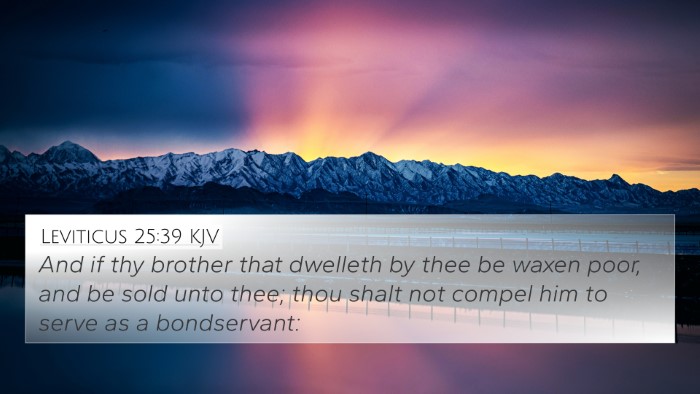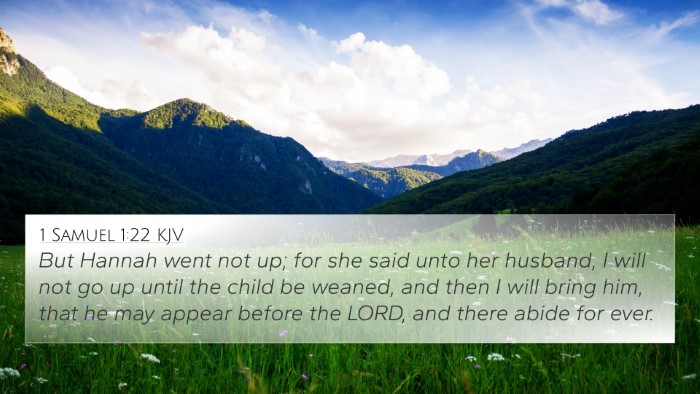Understanding Deuteronomy 15:17
Bible Verse: Deuteronomy 15:17 - "Then you shall take an awl and thrust it through his ear to the door, and he shall be your servant forever. Also, you shall do likewise to your female servant."
Interpretation and Meaning
This verse discusses the practice of indentured servitude among the Israelites, providing a detailed look at the concept of servitude and freedom.
Contextual Analysis
In the broader context of Deuteronomy, Moses is delineating laws that govern the Israelites. Chapter 15 deals with the release of Hebrew servants every seven years and the obligation to treat them well. The act of piercing the ear signifies a voluntary choice made by a servant to remain with the master beyond the time of obligation.
Significance of the "Awl" Action
The action of using an awl to pierce the ear is symbolic of a deep commitment to servitude. It reflects the servant's decision to willingly bind themselves to the household, highlighting a critical principle in their society: servitude can be both a burden and a voluntary commitment based on the relationship between the master and servant.
Insights from Commentaries
- Matthew Henry: Emphasizes the choice of the servant and the implications of such a decision, noting that the servant recognizes the goodness of the master and chooses to remain in service rather than be free.
- Albert Barnes: Discusses the cultural and legal implications of servitude, noting that this custom was much different from slavery, as it was bound by mutual agreements and respect.
- Adam Clarke: Highlights the symbolic act of the ear-piercing, suggesting it represents the servant's listening ear and an associated commitment to serve faithfully and attentively.
Thematic Bible Verse Connections
This verse significantly connects to the themes of servitude, freedom, and commitment in the Bible, echoing throughout other scriptures. Here are several related verses:
- Exodus 21:6: Discusses the law of servitude and the ear-piercing concept as well.
- Leviticus 25:39-40: Highlights compassion towards fellow Israelites and regulations around servitude.
- Matthew 10:24-25: Jesus speaks about the nature of servitude and masterhood.
- Galatians 5:13: Affirms the concept of serving one another in love, indicating a voluntary allegiance.
- Romans 6:16: Expounds on who we choose to serve, highlighting the significance of service to righteousness.
- 1 Peter 2:16: Calls believers to live as free people, yet also as servants to God.
- Philippians 2:7: Points out Christ's example of taking on the form of a servant.
Comparative Bible Verse Analysis
The act of servitude showcased in Deuteronomy ties into various strong concepts and traditions within the Scriptures. This voluntary servitude represents a form of covenant relationship that reflects God's desire for his people to engage in loving and respectful servitude to one another. In addition to the mentioned verses, here are other themes to consider:
- 1 Corinthians 7:21: Addresses the nature of slavery and conditions for servanthood in the context of freedom in Christ.
- Colossians 3:22: Encourages servants to obey their earthly masters, tying the theme of service into New Testament instructions.
- Luke 16:13: Jesus' teaching on serving two masters, illustrating the ultimate servitude to God over earthly attachments.
Cross-Referencing Biblical Texts
This verse is a prime example of inter-Biblical dialogue, offering profound insights when linked to other scriptural references. The surrounding verses in the Torah often echo similar themes of social justice, honor, and responsibility between individuals.
Utilizing Tools for Bible Cross-Referencing
For those studying Scripture deeply, tools such as a Bible concordance, cross-reference Bible study, and comprehensive Bible cross-reference materials can enhance understanding significantly. Here are a few methods to consider:
- Bible Concordance: A comprehensive index of keywords, which can lead to related scriptures.
- Cross-Reference Bible Study Techniques: Methods that encourage studying multiple verses that share similar themes or topics.
- Identifying Connections: Finding and exploring connections between Old and New Testament themes and teachings.
Conclusion
Deuteronomy 15:17 serves as a profound reminder of the relational dynamics rooted within servitude and commitment. Through careful study and cross-referencing, believers can extract deeper theological and practical applications that resonate throughout both the Old and New Testaments. The practice of linking Bible scriptures fosters a richer understanding of biblical truths and encourages believers to live in the light of servitude shaped by love, respect, and divine guidance.
